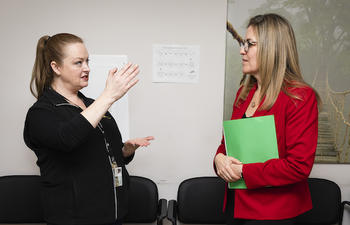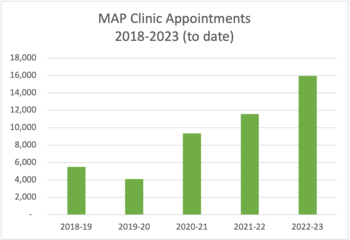
Empowered Communities Opioid Partnership extends Mason’s efforts to reduce overdoses for those involved in the criminal justice system
Rebecca Sutter, professor in the School of Nursing and director of the Mason and Partner Clinics also oversees the Empowered Communities Opioid Partnership (ECOP) – a $2.8 million initiative serving five local health districts (Prince William, Chesterfield, Crater, Portsmouth, and Norfolk) with the goal of reducing opioid-related overdose deaths, non-fatal overdoses, and adverse health consequences among those newly released from jail or prison.
“The chance of overdose or relapsing can be up to 129% higher in the two weeks after release, so we are committed to working with partners in the criminal justice and community-based systems of care to connect high-risk individuals quickly and with low barriers to the care they need,” said Sutter. ECOP has screened more than 950 patients to date and is looking at opening a dedicated Center in early 2024.
In This Story
Mason and Partner Clinics see 189% increase in appointments since 2018 and delivered $3.8 million in free services to the community
Economic downturn and reductions in Medicaid coverage drive demand for free wellness, preventative, and COVID-related services.
For the past five years, the Mason and Partner (MAP) Clinics have filled an important gap in community health services. In close partnership with area health districts and other service providers, the MAP Clinics have responded to community need with increased accessibility, expanded services, and unwavering support.
During the COVID-19 pandemic alone, the nine MAP Clinics delivered more than 58,220 vaccines and 6,650 COVID tests – providing more than $3,800,000 in free services to the community. The pandemic not only increased demand for health care – it raised awareness about the valuable services offered by the MAP Clinics.

MAP Clinic faculty and staff built deep trust and relationships within the communities they serve – which created a natural place to seek care when economic challenges and/or Medicaid reductions adversely affected vulnerable populations. In addition, the MAP Clinics placed a greater emphasis on preventive care and education post-pandemic to help patients manage their health conditions before they become severe.
“To best meet the needs of the community, the MAP Clinics continually seek new collaborations and partnerships with grassroot community organizations and government agencies. With the deepening opioid crisis, we’ve expanded access for those suffering from this horrible disease through expansion of our Medication for Opioid Use clinics and have expanded our network of peer-recovery support specialists to further assist those struggling with addiction,” says Rebecca Sutter, professor in the School of Nursing and director of the Mason and Partner Clinics.
